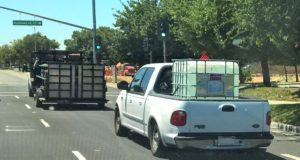
275 gallon tote in an Ford F150.
The City of Brentwood has a love affair with recycled water. Driving into town it became obvious why such a small treatment plant has given away so much water. Nearly every capable vehicle is either hauling a tote or towing a trailer with a recycled water tank on it. At every stoplight, driving by the gas station, in front of the local Ace Hardware, it seems like everyone hauls recycled water, an impressive feat considering less than 3% of the population does it.
For its one year anniversary, Casey Wichert, Wastewater Operations Manager at the City of Brentwood, invited me to tour their Residential Recycled Water Fill Station and Water Resource Recovery Facility.
In the heart of the 2015 California Drought, City of Brentwood followed the lead of Dublin San Ramon Services District and opened a recycled water fill station for their customers to haul water for landscape irrigation. This innovative and efficient treatment plant has provided the community with over 22.7 million gallons of recycle water this year to residential haulers. Recycled water is a perfect non-potable alternative to save drinking water supplies when watering the landscape.
 Last summer, the City of Brentwood had one of the most conservative water reductions in the state, 35%. “Residents are generally very environmentally conscience,” Casey said as we walked past vast swaths of green lawn. “They bring their reusable bags to the grocery store, shop at the local farmers market,” and come pick up their irrigation water at the recycled water fill station. “This is a vibrant farming community, full of smart people who care about the environment.”
Last summer, the City of Brentwood had one of the most conservative water reductions in the state, 35%. “Residents are generally very environmentally conscience,” Casey said as we walked past vast swaths of green lawn. “They bring their reusable bags to the grocery store, shop at the local farmers market,” and come pick up their irrigation water at the recycled water fill station. “This is a vibrant farming community, full of smart people who care about the environment.”
New Age Chores
Meet Edwin. He is the morning fill station attendant and self described “most popular guy in the City of Brentwood.” It is amazing that he doesn’t hold a key to the city yet. Edwin is responsible for training new users, placing stickers on containers and checking customers into the station. He can’t take all the credit though. His brother Brandon works the afternoon shift. On weekends a city employee takes over, welcoming residents as they come to haul their free irrigation water.
Edwin says he knows “about 500 people” by name. They show up, usually in a pickup truck or a SUV towing a trailer, proudly showing their purple sticker on their tank. Edwin welcomes everyone and directs them to a hose bib. He marks an X on his sheet, signifying another happy customer has arrived. In the 10 minutes we talked, 16 vehicles came to fill up.
“Residents haul because it helps keep home values up,” Edwin remarked. “Recycled water grows the grass.”
Last summer, the City of Brentwood enacted a 35% water conservation target. With that came fines. If homeowners used more than their allotment, they received a $100 fine on first offense. $200 on second, and $300 on third. Homeowners flocked to the fill station to take home free recycled water to keep their lawns alive. To some neighbors, green grass meant wasted water and out came the “water police”. Residents weren’t using drinking water, they were using recycled water.
The solution? Yard signs. Three batches were printed and displayed, they’re free to any residential hauler that wants to let their neighbors know they’re not using potable water during restrictions. Edwin continued, “people ask us why we don’t charge for it, we say, you’ve already paid for it!”
The City is able to distribute recycled water at no additional cost to residents because the wastewater enterprise currently covers the cost of treating the water (making it safe for Marsh Creek), and producing the recycled water for use City-wide.
Brentwood gets hot during the summer. “We built a shed out here to store everything we need to run the fill station. Training materials, stickers, yard signs. Since we’re so busy, we also added an overhang for our guy to stay out of the sun,” Casey added.
Edwin laughed as he said “I was recently at Diggers Diner,” a local burger joint. A patron “ran up to me and said ‘My mom loves you!,’ that’s what happens when you’re the attendant at the fill station. People love us. They have given us sodas, sport drinks, ice, and a cooler.”
As we talked a young man drove up, I motioned to Casey and Edwin – ‘he looks too young to be a homeowner.’
“Lots of teens are hauling recycled water for their parents,” Casey replied. “Mom and Dad are at work, kids are home so they get sent to haul water for the lawn.” It’s like new age chores.
It takes 2-5 minutes to fill a 300 gallon tote and most people will make multiple trips every day. “Almost everyone works, they come on their lunch breaks or when they get off work,” Edwin added.
The fill station is closed every holiday, but the day after, especially if it’s hot, “we’ll be packed with lines down the street.”
How does the City of Brentwood create such a seemingly endless supply of recycled water? By treating everything that comes into the plant to strict state of California Title 22 regulations. After our visit of the fill station, Casey Wichert took me for a tour to show how sewer water becomes the recycled water commodity that everyone wants.
This series continues next week in our next article titled “Water Resource Recovery Facility – City of Brentwood”.

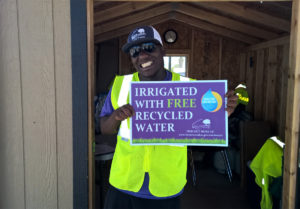
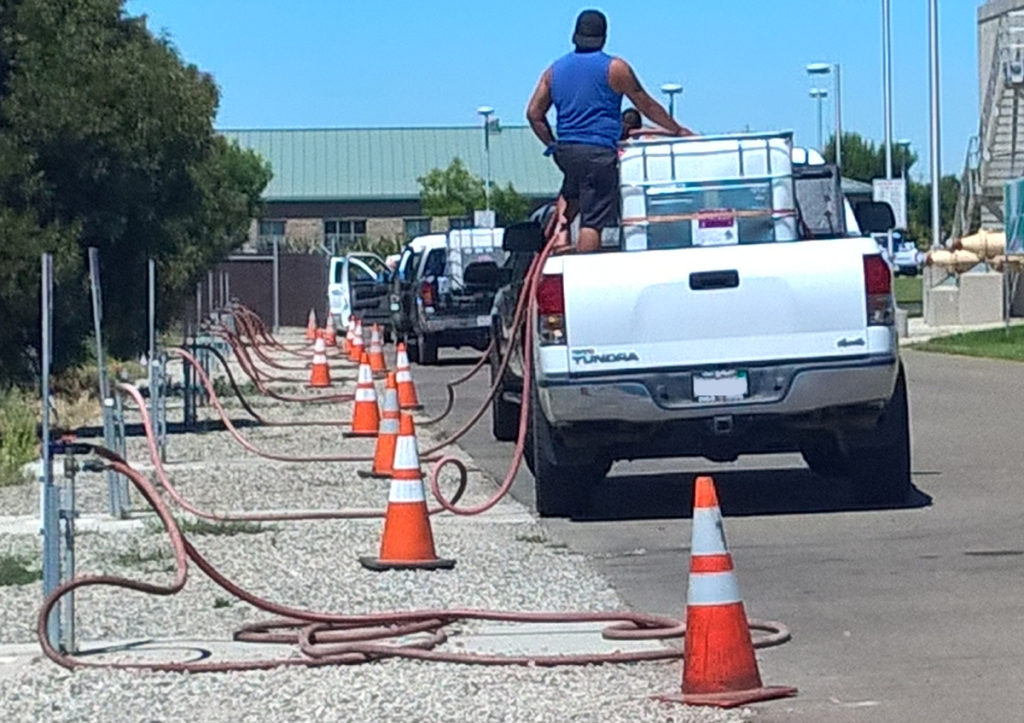
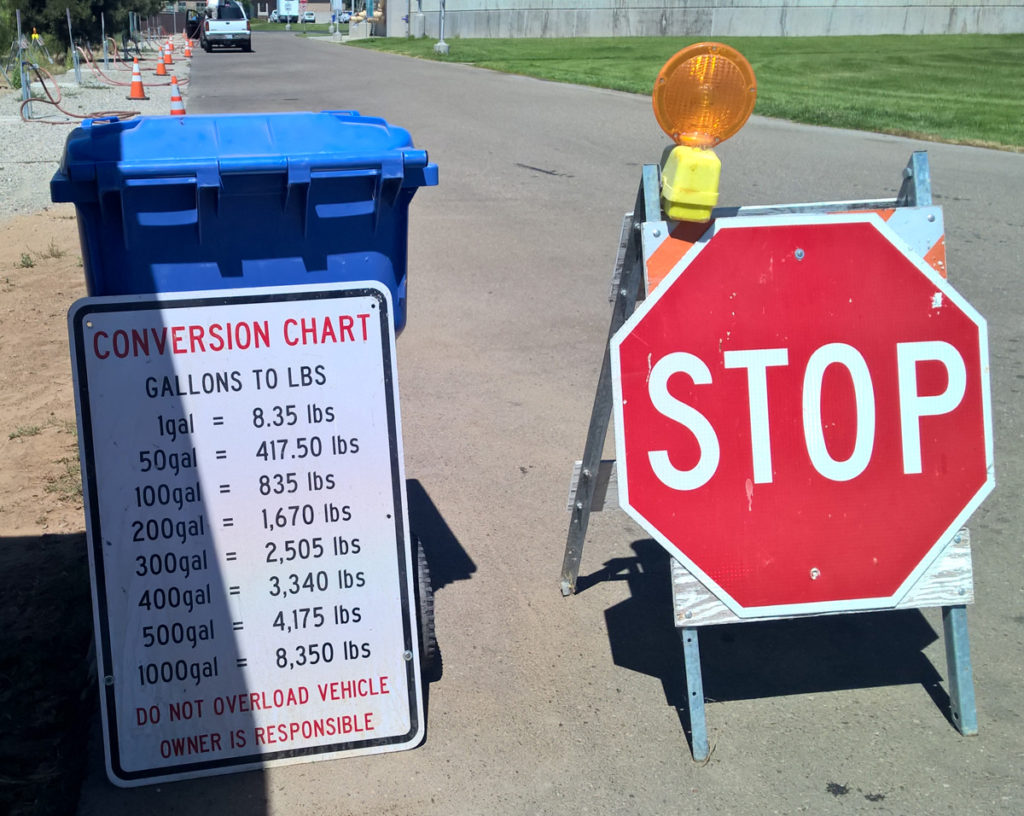
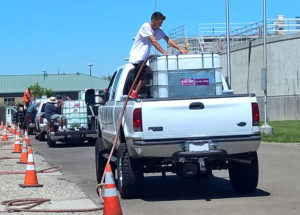
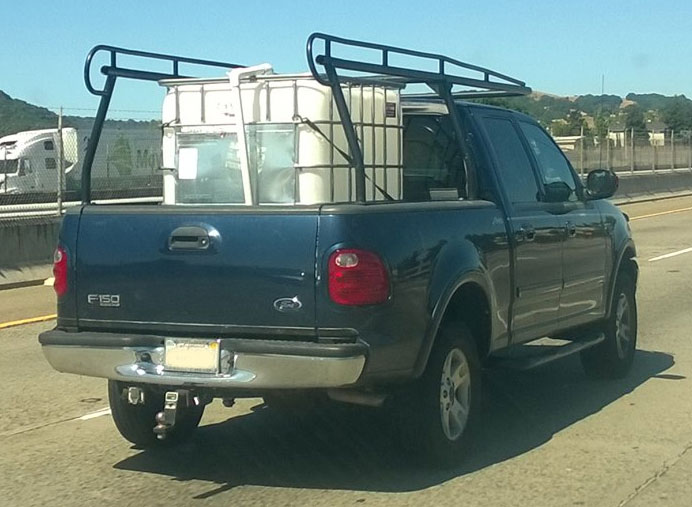
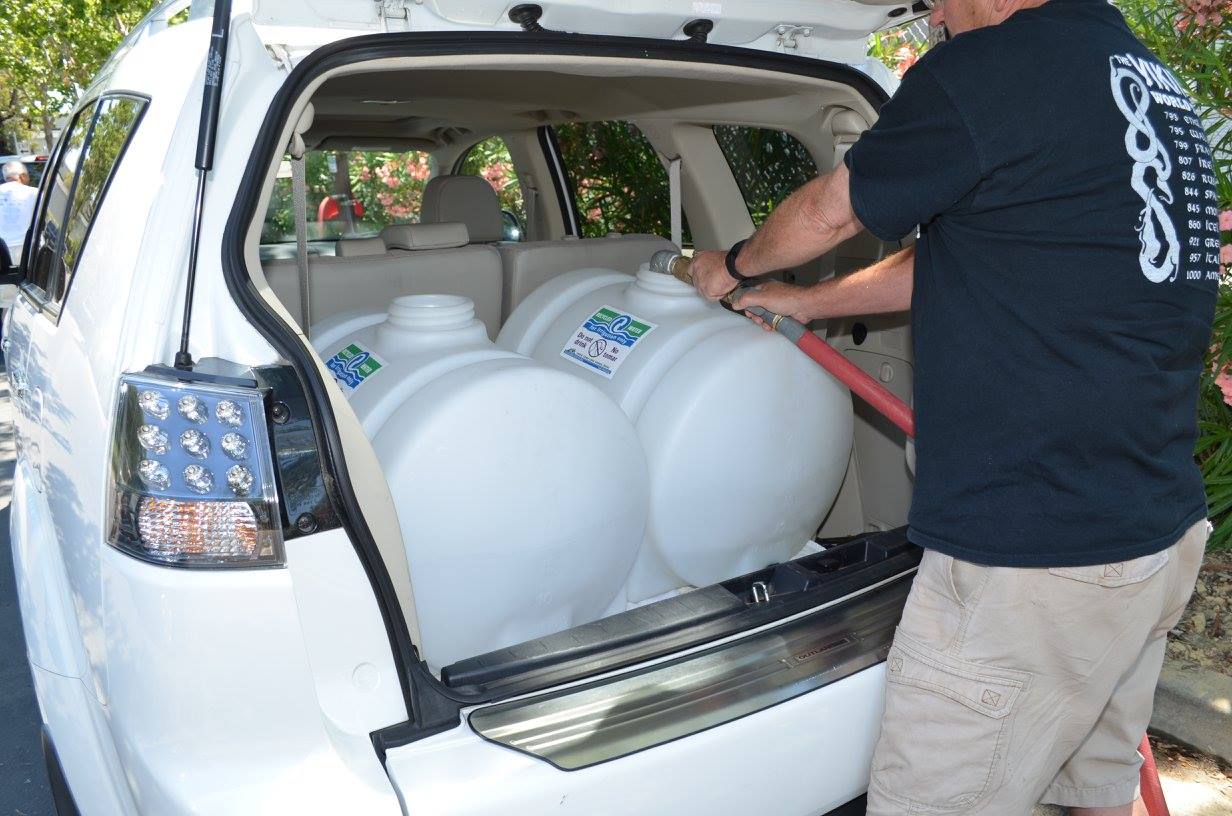
Leave a Reply